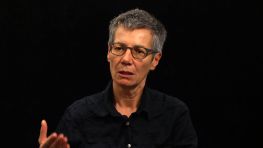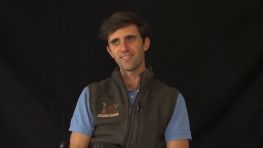 Jocelyne Porcher
Jocelyne Porcher Alberto Lopez de Ipiña
Agricoltore della comunità di Alava nei Paesi Baschi
Alberto Lopez de Ipiña, was born in Manurga, Spain, in 1960; he has been interviewed for the Granaries of Memory during Terra Madre 2012.
He was born in a little village, inhabited by 90 people, in the community of Alava, in the North of Spain. Lopez narrates life and traditions of himself, his family and his hamlet, going from his childhood, spent outdoor, working on the fields, to rites linked to religious celebrations.
Food has a relevant position in his narration, because his family used to live just by auto-sustenance: he describes typical Basque products and the biodiversity of flora and fauna that characterizes Alava, but also the moments of food sharing, in particular in breaks during collective works. Are than explained some typical recipes and dishes of his family, such as “bacalao al pil pil”, that is salt cod with a sauce made of garlic and chili pepper.
Lopez also describes the customs and the traditions of farmer's world, the periodicity and the need to follow Earth’s rhythm, the propitiatory rites, the collective tasks and the unusual professionals, such as “curanderos”, that were healers able to use plants and natural remedies to attend village’s inhabitants.Video table of contents
Interview information
Country: ES
City: Manurga
Altitude: 0m s.l.m.
Wikipedia: http://es.wikipedia.org/wiki/%C3%81lava
Alberto Lopez de Ipiña
Year: 1960
City: Manurga
Languages: Spagnolo
Document by: Alberto Meneghel
Video by: Dario Leone
Created: 27-10-2012
Questo video fa parte del seguente archivio
Terra Madre
Terra Madre
The archive collects the experiences of the world’s various societies, music and traditions of the food community who meet in Turin every two years to share experiences and knowledge. The archive illustrates the lives of farmers, fishermen, breeders, producers who participated in the worldwide network “Terra Madre (Mother Earth”)”. The interviews highlight the connections between traditional products and the place where they live. Research promoted by the University of Gastronomic Sciences and Slow Food.






